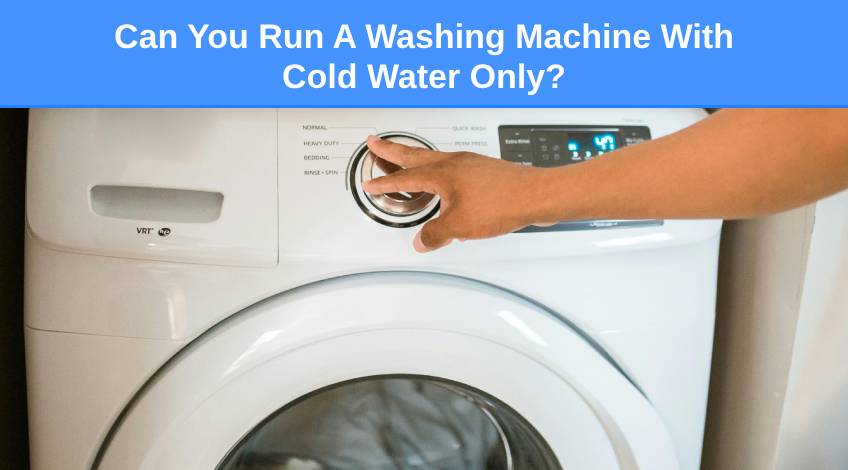
Can You Run A Washing Machine With Cold Water Only?
Most modern washing machines sold in the UK are cold fill only. This means they are only connected to the cold water supply and heat the water via a heating element that is one of the components of the washing machine.
Older washing machines were connected to the cold water and the hot water supply. They never had a built-in heating element, and relied on your home’s hot water supply to supply hot water which had the temperature adjusted by the cold fill.
But, is it possible to run a hot & cold feed washer just using cold water? Say, for instance, that your home boiler stopped working and you had a wash load that needed doing urgently.
In most cases, your washer will have a cycle that will allow you to use just cold water. Plus, most new washing machines are designed to only run using cold water. Keep reading to find out more.
Why Are Most New Washing Machines Cold Water Only?
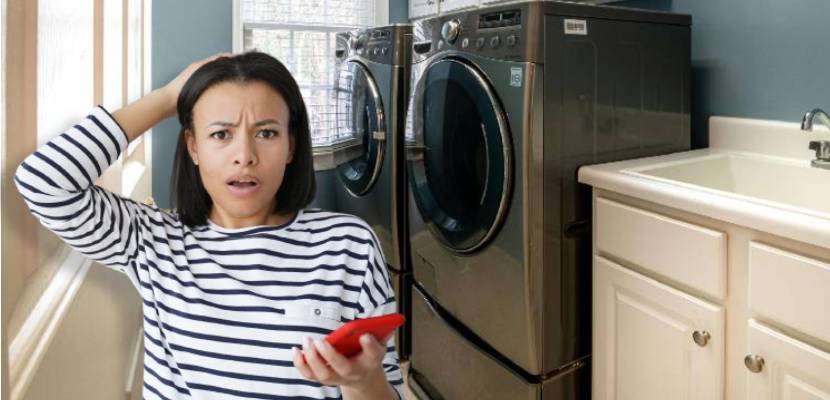
Almost all modern washing machines are designed to run using just a cold water fill system. This means that there is no provision to use hot water when filling the appliance.
There are a few reasons for this which are;
A Cold Fill Only Washing Machine Is Cheaper To Produce
In the older hot & cold fill washers there were extra components needed to ensure the appliance ran smoothly. Both the hot and cold fill would need inlet hoses, inlet valves, and other extra components that would all need assembling and fitting into the appliance.
These extra components meant extra labour costs as well as extra costs for the parts etc. The washing machine market, just like any other market, is a cut throat business.
With every manufacturer vying for the same customers, they need to keep production costs as low as possible to keep the retail price low enough to attract buyers. This means the more they can save on production costs, the more likely they are to be able to sell their products in such a competitive market.
A Cold Fill Washing Machine Is More Ecological And Environmentally Friendly
As we all become more aware of environmental issues, it tends to influence the way we spend our money. Modern washing machines have been designed to successfully wash clothes at ridiculously low temperatures compared to 50 years ago.
With many modern synthetic fabrics and modern detergents designed to clean garments even at low temperatures, there’s hardly any need for a 90o C wash cycle any more.
These modern designs have eliminated the need for a hot water supply to heat the water to a high temperature. Hot water washes are a relatively rare requirement nowadays and are really only need to clean the washer once a month.
Does The Type Of Washer Make A Difference?
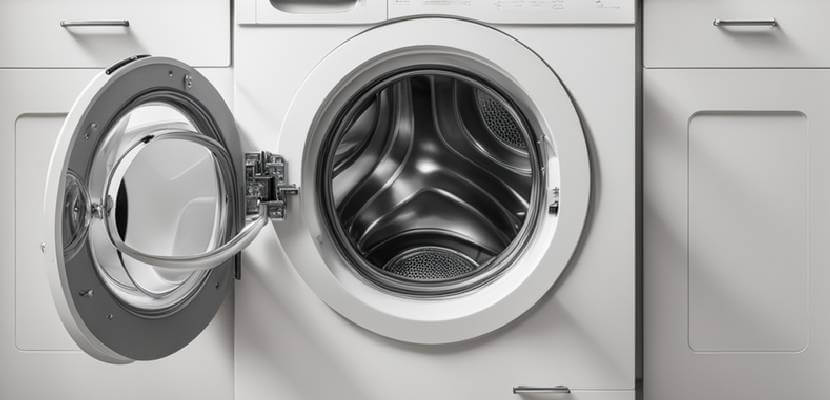
There are two types of washing machine;
- Front Loaders
- Top Loaders
Pretty much all new front loader and top loader washers are cold fill only nowadays. This is because they are cheaper to produce and more environmentally and eco friendly.
However, if you own an older washing machine, it might need a hot and cold water supply. This should be evident because it will have two inlet hoses, one coloured red (hot) and one coloured blue (cold).
If you’re still not sure, contact the manufacturer and ask them. It will speed things up if you have noted the serial number of your appliance.
Can You Run A Cold Wash On A Hot & Cold Fill Washer?
Most dual fill washers have a cold wash option which can be selected and allows you to run a cold water wash cycle. It is also possible to turn off the water heater which will then only have the ability to supply cold water to the washer.
This is handy if your water heater breaks down for example, as you will still be able to use your washing machine. This might take longer than a warm or hot wash but that’s about the only problem that you’re likely to encounter.
Can You Connect The Cold Fill To The Hot Water Supply?
As I said earlier, most modern washing machines are cold fill only and are designed to function using only cold water. If you were to connect the cold fill hose to your hot water feed, you could cause serious damage to the hose and the appliance too.
If you were thinking of connecting the hot water supply to the cold water inlet on your washer to save time, it wouldn’t work. This is because the temperature of the water that comes from your water heater will not be the exact temperature required by your washing machine to wash your clothes on the cycle you have selected.
This means the washer will need to add cold water to cool it down or spend time reheating the water which will cost more on your energy bills.
What Do You Need To Run A Washing Machine With Cold Water?
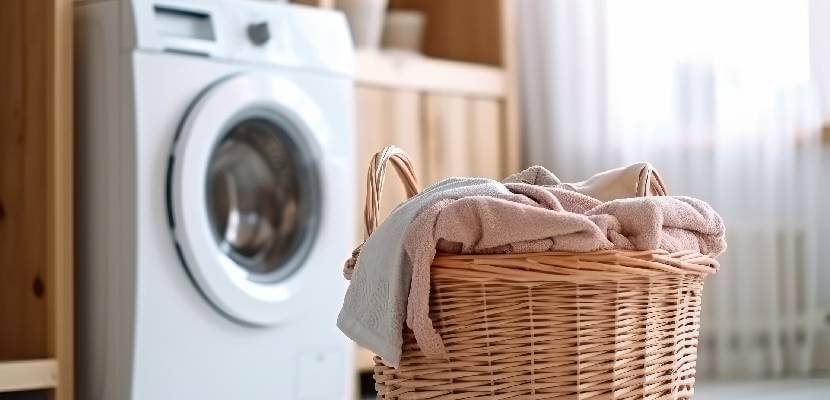
There are a few requirements to successfully run a washing machine using just cold water which are;
Cold Water Detergent
You will find that not all detergents work well with cold water. You need to use a cold water detergent if you decide to run your washer on only cold water.
These biological detergents contain enzymes that can work to clean clothes at temperatures as low as 20o C. Cold water detergents are typically liquid detergents because powders need warmer water to dissolve correctly.
Relatively Mild Conditions
Even though it’s OK to run your washer using a cold water wash, you need to be mindful of the temperature of the water. If the weather is cold and icy, the water coming into your home will also be extremely cold.
This can have an effect on the enzymes in the detergent. These cold water detergents are designed to operate effectively at temperatures of 15o C and above. Any lower and they won’t clean or disinfect as they should.
Which Clothes Do Better In A Cold Wash Cycle?
There are a few types of clothes that actually do better in a cold wash, these include;
- Delicate Fabrics
Cold water wash cycles are great for washing delicate fabrics (consult the wash care label in the garment). This includes; - Wool
- Silk
- Acrylics
It’s a good idea to wash sportswear, as well as light summer clothes in a cold water wash too. - Dark or Coloured Clothes
Using a cold water wash cycle for dark or coloured clothes will help to prevent colour bleeds or fading in those clothes.
What Are The Pros & Cons Of Running A Cold Water Cycle On Your Washer?
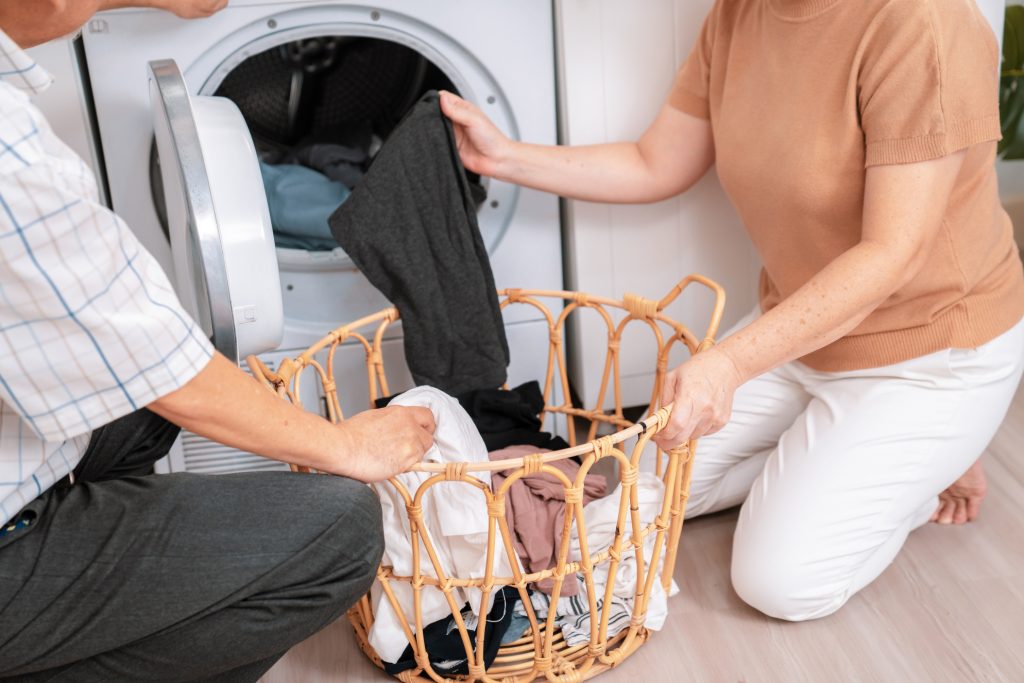
There are several advantages and disadvantages to running a cold wash only cycle on your washer these include;
Advantages
Running your washing machine on a cold water only cycle typically has the following advantages;
- Prevents Fabrics From Shrinking
Washing clothes in hot water is more likely to cause them to shrink. Whereas washing clothes in cold water prevents the fabrics from shrinking. - Prevents Colours From Fading
Washing clothes in hot water can cause bright colours or darker clothes to fade and lead to the colour running. Cold water washes are less likely to cause fading or colour bleeding. - Saves Energy
Using a cold water wash uses less energy which is better for the environment as well as saving you money. - Removes Light Soiling
As long as the garments aren’t heavily stained, a cold water wash will remove dirt and stains.
Disadvantages
The disadvantages of running a washer on a cold water only cycle include;
- Won’t Remove Stubborn Or Ingrained Stains
There are certain stains like oil, blood, sweat or some sauce stains that often won’t be removed without the use of a hot water wash. - Won’t Remove germs From Clothes
Even if the stains are removed, in some cases germs and bacteria can survive cold water washing. Many stains and bacteria need a temperature of at least 60o C to be destroyed.
Do Washing Machines Need A Hot Water Supply?

The answer to this question is, sometimes. You see, modern cold fill only washers don’t need a hot water supply because they heat the cold water supplied to them to the required temperature. However, if your washer has two inlet hoses, one will be for cold water and the other will be for hot water.
If this is the case, then your washer does need hot water. So your washer only needs a hot water supply if it has two inlet connections. If it only has one connection point for a water supply, it will be for cold water only.
The washer will then use a built in heating element to get the water to the required temperature for the cycle selected.
Should Your Washing Machine Be Connected To Hot Or Cold Water?
As I just said, this depends on how many connection points there are on your washing machine. If your washer has two water connection points (spaces for the water inlet hoses) then it should be connected to the hot and cold water supply.
You will need to ensure that the hot water supply is connected to the hot water inlet valve. If you were to connect the hot water supply to the cold water inlet on your washer, it could cause serious damage to your appliance.
Follow the colour coded system;
- Red = Hot
- Blue = Cold
The red port should be connected to the hot water supply and the blue port should be connected to the cold water supply. The pipes in your home that supply water to the washer should also have taps with the same red and blue colour code to ensure they’re not mixed up.
Let’s take a brief look at the differences between hot and cold water wash cycles and their effects on certain fabrics and other factors.
Differences Between Hot & Cold Water Wash Cycles:
| Cold Water | Hot Water | |
|---|---|---|
| Fabric | Delicate fabrics like wool, silk, acrylic, etc | More robust fabrics like synthetics including nylon, polyester, rayon, etc |
| Colours Of Clothes | Dark, as well as colourful, bright clothes | White Clothes |
| Possibility Of Shrinkage | Less chance of shrinking clothes | More likely to shrink delicate fabrics |
| Possibility Of Fading Clothes | Less chance of fading or colour bleeding | More likely to fade clothes or cause colour bleeding |
| Possibility Of Damaging Clothes | Less likely to cause damage to clothes | More likely to damage clothes |
| Ability To Remove Germs & Bacteria | Less likely to remove germs & bacteria | More likely to remove germs & bacteria |
| Ability To Remove Stains | Less likely to remove stubborn stains | More likely to remove stubborn stains |
| Temperature Range | 20-30o C | 60-90o C |
| Detergent Type | Cold water biological liquid detergent | Hot water biological powder or liquid detergent |
| Cycle Length | Long cycle length | Shorter cycle length |
Can You Use A Hot Fill Washer Using Just Cold Water?
If your hot water supply has run out or the boiler has packed up for any reason, you can use the washer but it won’t heat up the water. This means you will effectively be running a cold wash cycle no matter which cycle you select.
It will not harm the appliance but it will almost certainly affect the way your laundry is cleaned. If you specifically selected a hot wash cycle to clean and sanitise bedding for example, the germs and bacteria will not be subjected to a temperature high enough to kill or remove those germs or bacteria.
However, if your washer is cold fill only it will have a heating element on board that will ensure the water reaches the required temperature to get the bedding clean and germ free.
SEE ALSO: Is 20 Degrees A “Cold Wash”? (when & how to use it)
Frequently Asked Questions
If your washing machine is connected to a hot water as well as a cold water supply, you can run it without hot water. However, it will default to a cold water cycle which should clean your clothes but it will not necessarily remove germs or bacteria.
Almost all modern washing machines do not need hot water and this is reflected by the use of only one water inlet hose which should be connected to the cold water supply for your home. The washer will have a built in heating element which heats the water to the required temperature for the wash cycle selected.
The hottest wash cycle on a washing machine is 90o C. However, many modern washers consider the hot wash to be 60o C.
Also, follow us on Pinterest ...



